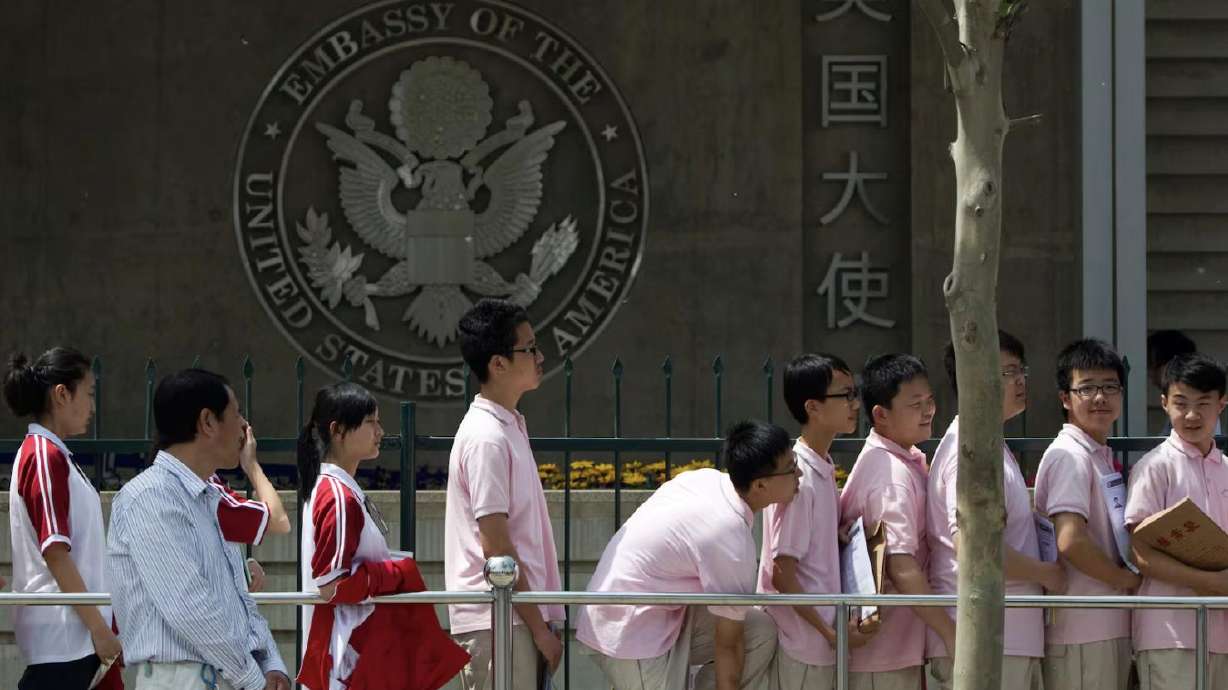- Trump administration requires international students to make social media profiles public.
- Visa interviews for F, M, and J visas will soon resume globally.
- International students contribute significantly to Utah's colleges, facing turbulent times recently.
SALT LAKE CITY — International students hoping to matriculate at American colleges and universities will soon be able to again apply for a visa — but only if they make their Instagram, Facebook, X and other social media profiles public.
Last month, the Trump administration halted the scheduling of new visa interviews for foreign students to develop its expanded online screening process.
This week, the U.S. State Department announced that "our overseas posts" will soon resume scheduling F, M, and J nonimmigrant visa applications.
F, M and J visas are the common types of nonimmigrant visas issued by the agency to foreign nationals who wish to study or participate in exchange visitor programs in the United States.
The State Department's announcement emphasized its commitment to "protecting our nation and our citizens" by upholding the "highest standards of national security and public safety" through the visa process.
A U.S. visa, the note added, is a privilege — not a right.
"We use all available information in our visa screening and vetting to identify visa applicants who are inadmissible to the United States, including those who pose a threat to U.S. national security," the announcement said.
"Under new guidance, we will conduct a comprehensive and thorough vetting — including online presence — of all student and exchange visitor applicants in the F, M, and J nonimmigrant classifications," it said.
All applicants for F, M and J visa are being instructed to adjust the privacy settings on all of their social media profiles to "public."
"Every visa adjudication is a national security decision," the announcement concluded.
"The United States must be vigilant during the visa issuance process to ensure that those applying for admission into the United States do not intend to harm Americans and our national interests," it said.
Meanwhile, Reuters reported that a State Department cable sent to U.S. missions this week instructed consular officers to conduct "a comprehensive and thorough vetting" of all student and exchange visitor applicants to identify those who "bear hostile attitudes toward our citizens, culture, government, institutions, or founding principles."
The cable also directed officers to look for "applicants who demonstrate a history of political activism, especially when it is associated with violence or with the views and activities described above, you must consider the likelihood they would continue such activity in the United States."
International students found across Utah's colleges
Students around the world have been waiting anxiously for U.S. consulates to reopen appointments for visa interviews, as the window left to book their travel and make housing arrangements narrows ahead of the start of the school year, The Associated Press reported.
On Wednesday afternoon, a 27-year-old doctoral student in Toronto was able to secure an appointment for a visa interview next week.
The student, a Chinese national, hopes to travel to the U.S. for a research internship that would start in late July. "I'm really relieved," said the student, who spoke on condition of being identified only by his surname, Chen, because he was concerned about being targeted.
"I've been refreshing the website a couple of times every day," he told The Associated Press.
More than 1 million international students from more than 210 foreign countries studied at U.S. colleges and universities during the 2023-2024 academic year — a 7% increase from the previous academic year, according to the IIE Open Doors report.
Those students, of course, deliver a significant cash amount to their respective schools in the form of tuition and other fees.
International students form a sizable block across Utah's colleges and universities. More than 3,500 international students and scholars are associated with the University of Utah. And students from over 100 countries are enrolled at Brigham Young University.

Even at a smaller regional public school such as St. George's Utah Tech University, the student body is represented by 36 nations.
When asked last month how the recent visa interview halt might impact the University of Utah, the school's senior international officer, Randy McCrillis, said the university typically has around 350 new international undergraduate and 500 new international graduate students each fall.
Turbulent times for international students
The past few months have been turbulent for international students in Utah and across the country and globe.
Beyond the recent halt to visa interviews, the U.S. Immigration and Customs enforcement temporarily revoked the legal status of hundreds of international students — including several studying at the Utah colleges and universities.
Many of the affected international students said their records were terminated based on charges that had been dismissed or for minor offenses when legally their status could only be revoked if they were convicted of violent crimes, Reuters reported.
Following a series of lawsuits across the country and wide public outcry, the Trump administration restored the legal statuses of scores of foreign students while it reportedly develops a new policy that will provide a framework for potentially ending them in the future.
Secretary of State Marco Rubio has said he has revoked the visas of hundreds, perhaps thousands of people, including students, because they got involved in activities that he said went against U.S. foreign policy priorities, Reuters reported.
Those activities include support for Palestinians and criticism of Israel's conduct in the war in Gaza.










